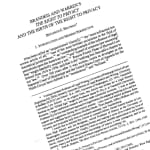Ben Bratman on the First Amendment and Brandeis & Warren’s “The Right to Privacy”
By Kristopher A. Nelson
in
December 2011
500 words / 2 min.
Tweet
Share
Ben Bratman’s 2002 law review article, “Brandeis & Warren’s ‘The Right to Privacy and the Birth of the Right to Privacy’” discusses the background of this issue in light of “the considerable focus that Brandeis and Warren placed on the print media and its alleged violations of privacy.”

Please note that this post is from 2011. Evaluate with care and in light of later events.
 Samuel Warren and Louis Brandeis’ 1890 law review article, “The Right to Privacy,” has been deeply influential over the last 100+ years. In it, Warren and Brandeis argue for a generalized right to an “inviolate personality” in the face, especially, of growing press prying and publishing of details of people’s private life, including photographs.
Samuel Warren and Louis Brandeis’ 1890 law review article, “The Right to Privacy,” has been deeply influential over the last 100+ years. In it, Warren and Brandeis argue for a generalized right to an “inviolate personality” in the face, especially, of growing press prying and publishing of details of people’s private life, including photographs.
Given this focus on press invasions, it is unsurprising that many scholars have seen their proposed new tort as interfering with the First Amendment guarantees of press freedoms. (See, e.g., Lorelai Van Wey’s Note, “Private Facts Tort: The End is Here.”) Ben Bratman’s 2002 law review article, “Brandeis & Warren’s ‘The Right to Privacy and the Birth of the Right to Privacy’” discusses the background of this issue in light of “the considerable focus that Brandeis and Warren placed on the print media and its alleged violations of privacy” (636).
In 1890, when Warren and Brandeis’ published their article, the First Amendment of the Bill of Rights had yet to be applied to the states, although many states had their own versions. Despite this, in many ways “freedom of speech and the press” was viewed in stronger terms then than now (despite the fact that the Alien and Sedition Acts of 1798 was never challenged by the Supreme Court). There was, for example, no perceived difference between commercial and political speech–both were granted the same level of protection. The nineteenth century juries Thomas Cooley’s position on the issue was generally considered the most persuasive:
The constitutional liberty of speech and ofthe press, as we understand it, implies a right to freely utter and publish whatever the citizen may please, and to be protected against any responsibility for so doing, except so far as such publications, from their blasphemy, obscenity, or scandalous character, may be a public offense, or as by their falsehood and malice they may injuriously affect the standing, reputation, or pecuniary interests of individuals. (Bratman 637)
Warren and Brandeis were not unaware of this potential conflict, and carved out an exception to their proposed tort by adding a
“public interest” or “public character” exception to their tort, which recognized that the press or commercial photographers had to be free to record and report the actions of public characters and officials (Bratman 636)
In other words, even Warren and Brandeis, despite their argument that they were not inventing anything new at all, recognized that the right to privacy they were articulating had the potential to conflict with the guarantees of the First Amendment.